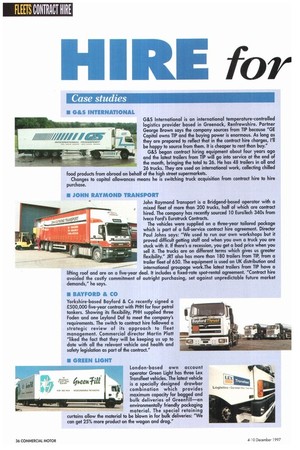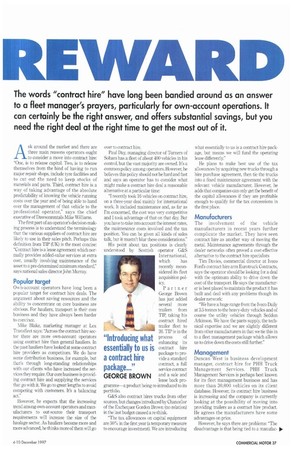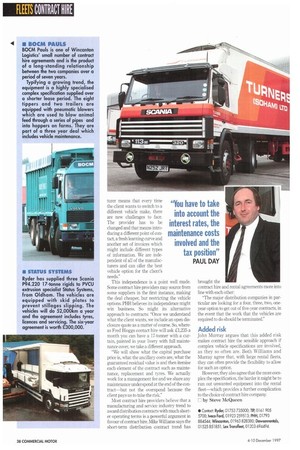FLEETS CONTRACT HIRE
Page 38

Page 39

Page 40

If you've noticed an error in this article please click here to report it so we can fix it.
The words "contract hire" have long been bandied around as an answer to a fleet manager's prayers, particularly for own-account operations. it can certainly be the right answer, and offers substantial savings, but you need the right deal at the right time to get the most out of it.
Case studies
• G&S INTERNATIONAL
G&S International is an international temperature-controlled logistics provider based in Greenock, Renfrewshire. Partner George Brown says the company sources from TIP because "GE Capital owns TIP and the buying power is enormous. As long as they are prepared to reflect that in the contract hire charges, I'll be happy to source from them. It is cheaper to rent than buy." G&S began contract hiring equipment about four years ago and the latest trailers from TIP will go into service at the end of the month, bringing the total to 26. He has 48 trailers in all and 26 trucks. They are used on international work, collecting chilled food products from abroad on behalf of the high street supermarkets. Changes to capital allowances means he is switching truck acquisition from contract hire to hire purchase.
• JOHN RAYMOND TRANSPORT
John Raymond Transport is a Bridgend-based operator with a mixed fleet of more than 200 trucks, half of which are contract hired. The company has recently sourced 10 EuroTech 340s from Iveco Ford's Eurotruck Contracts.
The vehicles were supplied on a three-year tailored package which is part of a full-service contract hire agreement. Director — Paul Johns says: "We used to run our own workshops but it proved difficult getting staff and when you own a truck you are stuck with it. If there's a recession, you get a bad price when you sell it. The trucks are on different terms which gives us greater flexibility." JRT also has more than 180 trailers from TIP, from a trailer fleet of 650. The equipment is used on UK distribution and
international groupage work.The latest trailers from TIP have a lifting roof and are on afive-year deal. It includes a fixed-rate spot-rental agreement. "Contract hire
avoided the costly commitment of outright purchasing, set against unpredictable future market demands," he says.
• BAYFORD & CO Yorkshire-based Bayford & Co recently signed a £500,000 five-year contract with PHH for four petrol tankers. Showing its flexibility, PHH supplied three Foden and one Leyland Daf to meet the company's requirements. The switch to contract hire followed a strategic review of its approach to fleet management. Commercial director Martin Platt "liked the fact that they will be keeping us up to date with all the relevant vehicle and health and safety legislation as part of the contract."
• GREEN LIGHT
London-based own account operator Green Light has three Lex Transfleet vehicles. The latest vehicle is a specially designed drawbar
IVYcombination which provides
maximum capacity for bagged and bulk deliveries of Greenfill—an environmentally friendly packaging material. The special retaining curtains allow the material to be blown in for bulk deliveries: "We can get 25% more product on the wagon and drag."
• BOCM PAULS
BOCM PauIs is one of Wincanton Logistics' small number of contract hire agreements and is the product of a long-standing relationship between the two companies over a period of seven years.
Typifying a growing trend, the equipment is a highly specialised complex specification supplied over a shorter lease period. The eight tippers and two trailers are equipped with pneumatic blowers which are used to blow animal feed through a series of pipes and into hoppers on farms. They are part of a three year deal which includes vehicle maintenance.
• STATUS SYSTEMS
Ryder has supplied three Scania P94.220 17-tonne rigids to PVCU extrusion specialist Status Systems, from Oldham. The vehicles are equipped with skid plates to prevent stillages slipping. The vehicles will do 52,000km a year and the agreement includes tyres, licences and servicing. The six-year agreement is worth £300,000. Ask around the market and there are three main reasons operators ought to consider a move into contract hire: "One, is to release capital. Two, is to release themselves from the bind of having to run major repair shops, include tyre facilities and to cut out the need to keep stocks of materials and parts. Third, contract hire is a way of taking advantage of the absolute predictability of knowing the vehicle running costs over the year and of being able to hand over the management of that vehicle to the professional operator," says the chief executive of Dawsonrentals Mike Williams.
The first part of an operator's decision-making process is to understand the terminology that the various suppliers of contract hire are likely to use in their sales pitch. Perhaps this definition from TIP (UK) is the most concise: "Contract hire is a lease agreement which normally provides added-value services at extra cost, usually involving maintenance of the asset to a pre-determined minimum standard," says national sales director John Murray.
Popular target
Own-account operators have long been a popular target for contract hire deals. The argument about saving resources and the ability to concentrate on core business are obvious. For hauliers, transport is their core business and they have always been harder to convince, Mike Blake, marketing manager at Lex Transfleet says: "Across the contract hire sector there are more own-account operators using contract hire than general hauliers. In the past hauliers have looked at some contract hire providers as competitors. We do have some distribution business, for example, but that's through long-standing relationships with our clients who have increased the services they require. Our core business is providing contract hire and supplying the services that go with it. We go to great lengths to avoid competing with customers. It's a balancing act."
However, he expects that the increasing trend among own-account operators and manufacturers to out-source their transport requirements will increase the size of the haulage sector. As hauliers become more and more advanced, he thinks more of them will go over to contract hire.
Paul Day, managing director of Turners of Soham has a fleet of about 400 vehicles in his control, but the vast majority are owned. It's a common policy among operators. However, he believes this policy should not be hard and fast and says an operator has to consider what might make a contract hire deal a reasonable alternative at a particular time: "I recently took 16 vehicles on contract hire, on a three-year deal mainly for international work. It included maintenance and, as far as I'm concerned, the cost was very competitive and I took advantage of that on that day. But you have to take into account the interest rates, the maintenance costs involved and the tax position. You can be given all kinds of sales talk, but it mustn't blur these considerations."
His point about tax positions is clearly understood by Scottish operator G&S International,
which has recently reconsidered its fleet acquisition poiicy
Partner George Brown has just added several more trailers from TIP, taking his contract hired trailer fleet to 26. TIP is in the process of enhancing its contract hire package to provide a standard contract, a full service contract and a sale and lease back programme—a product being re-introduced to its portfolio.
G&S also contract hires trucks from other sources, hut changes introduced by Chancellor of the Exchequer Gordon Brown (no relation) in the last budget caused a re-think.
"The tax allowances on capital equipment are 50% in the first year (a temporary measure to encourage investment). We are introducing
"Introducing what essentially to us is a contract hire package...
GEORGE BROWN
what essentially to us is a contract hire package, but means we will fund the operating lease differently."
He plans to make best use of the tax allowances by acquiring new trucks through a hire purchase agreement, then tie the trucks into a fixed maintenance agreement with the relevant vehicle manufacturer. However, he adds that companies can only get the benefit of the capital allowances if they are profitable enough to qualify for the tax concessions in the first place.
Manufadurers
The involvement of the vehicle manufacturers in recent years further complicate the market. They have seen contract hire as another way of moving the metal. Maintenance agreements through the dealer networks often proved a cost-effective alternative to the contract hire specialists Tim Davies, commercial director at Iveco Ford's contract hire arm Eurotruck Contracts, says the operator should be looking for a deal with the optimum ability to drive down the cost of the transport. He says the manufacturer is best placed to maintain the product it has built and deal with any problems though its dealer network: "We have a huge range from the Iveco Daily at 3.5 tonnes to the heavy-duty vehicles and of course the utility vehicles through Seddon Atkinson. We have the parts supply, the technical expertise and we are slightly different from other manufacturers in that we tie this in to a fleet management package which allows us to drive down the costs still further."
Management
Duncan West is business development manager, contract hire for PHH Truck Management Services. PHH Truck Management Services is perhaps best known for its fleet management business and has more than 30,000 vehicles on its client database. However, its contract hire business is increasing and the company is currently looking at the possibility of moving into providing trailers as a contract hire product. He agrees the manufacturers have some advantages on price.
However, he says there are problems: "The disadvantage is that being tied to a rnanufac turer means that every time the client wants to switch to a different vehicle make, there are new challenges to face. The provider has to be changed and that means introducing a different point of contact, a fresh learning curve and another set of invoices which might include different types of information. We are independent of all of the manufacturers and can offer the best vehicle option for the client's needs."
This independence is a point well made. Some contract hire providers may source from some suppliers in the first instance, making the deal cheaper, but restricting the vehicle options. PHH believes its independence might win business. So might its alternative approach to contracts: "Once we understand what the client wants, we include an open disclosure quote as a matter of course. So, whereas Fred Bloggs contact hire will ask £1,235 a month you can have a 17-tonner with a curtain, painted in your livery with full maintenance cover, we take a different approach.
"We will show what the capital purchase price is, what the ancillary costs are, what the guaranteed residual value is and then itemise each element of the contract such as maintenance, replacement and tyres. We actually work for a management fee and we share any maintenance underspend at the end of the contract—but not the overspend because the client pays us to take the risk."
Most contract hire providers believe that a manufacturing and service industry trend to award distribution contracts with much shorter operating terms is a powerful argument in favour of contract hire. Mike Williams says the short-term distribution contract trend has brought the contract hire and rental agreements more into line with each other: "The major distribution companies in particular are looking for a four, three, two, oneyear option to get out of five-year contracts, in the event that the work that the vehicles are required to do should be terminated."
Added risk
John Murray argues that this added risk makes contract hire the sensible approach if complex vehicle specifications are involved, as they so often are. Both Williams and Murray agree that, with large rental fleets, they can often provide the flexibility to allow for such an option.
However, they also agree that the more complex the specification, the harder it might be to run out unwanted equipment into the rental fleet—which provides a further complication to the choice of contract hire company.
E by Steve McQueen • Contact: Ryder, 01753 735000; TIP, 0161 905 5700; lveco Ford, 01923259513; PHH, 01793 884544; WinconIon, 01963 828380; Dowsonrentals, 01525 851851, Lex Tronsfleet, 01203 694494.
















































































































